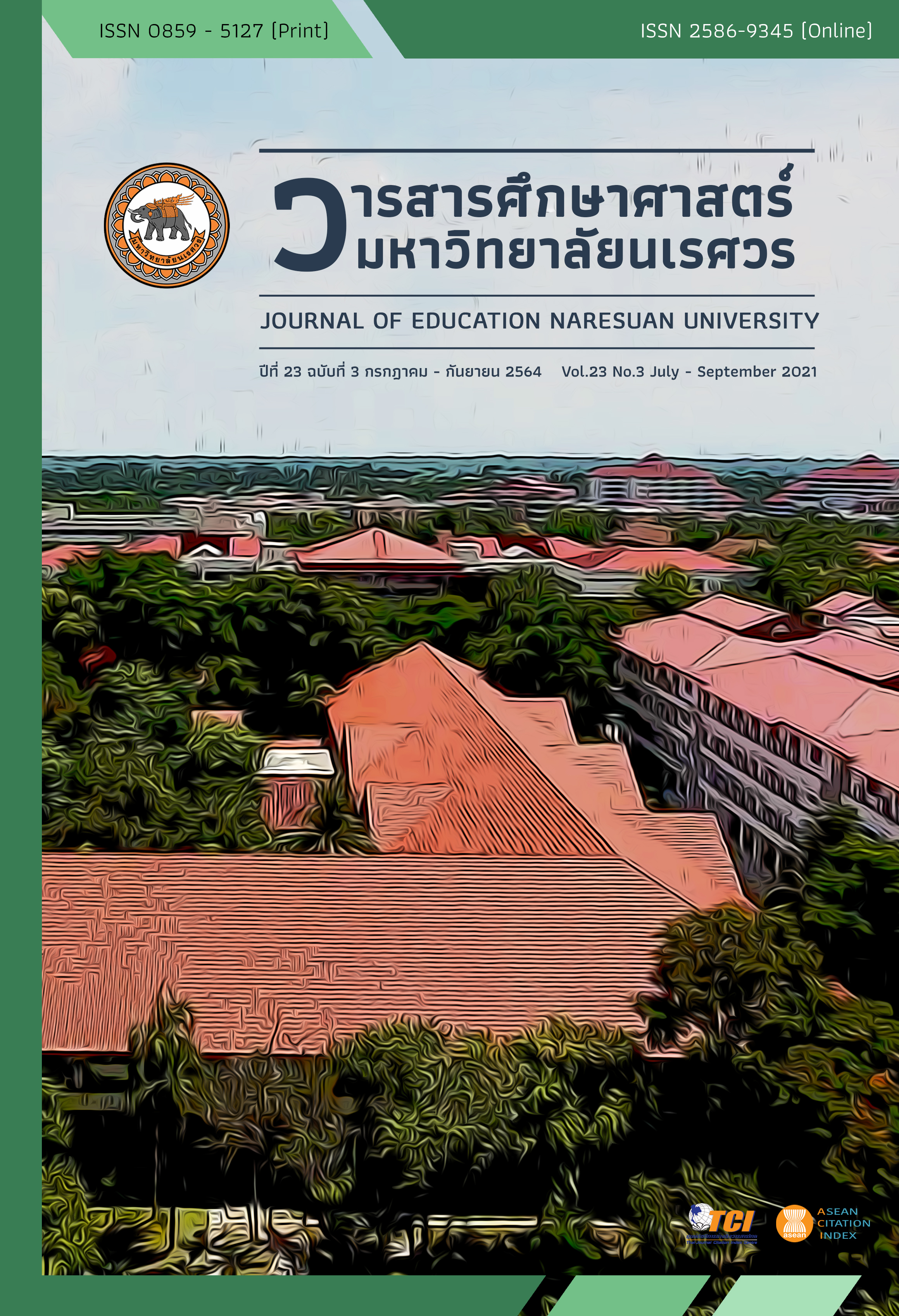A STUDY OF SCIENTIFIC CONCEPTS AND CONSTRUCTING SCIENTIFIC MODEL ABILITY USING MODEL-BASED LEARNING FOR 12TH GRADE STUDENTS การศึกษามโนทัศน์ทางวิทยาศาสตร์ และความสามารถในการสร้างแบบจำลองทางวิทยาศาสตร์ด้วยการจัดการเรียนรู้โดยใช้แบบจำลองเป็นฐาน ของนักเรียนชั้นมัธยมศึกษาปีที่ 6
Main Article Content
Abstract
The purposes of this research were to compare scientific concepts and constructing scientific model ability of 12th grade students after using model-based learning with traditional instruction and to compare scientific concepts and constructing scientific model ability before and after using model-based learning. The sample were two classrooms of twelfth grade students from High School in Chonburi. The research instruments consisted of model-based learning lesson plans, traditional instruction lesson plans, scientific concepts test and constructing scientific model ability test. The data were analyzed by mean, standard deviation, t-test for dependent sample, and t-test for independent sample. The results of this study indicated that:
1. The scientific concepts and constructing scientific model ability of students after using Model-Based Learning technique were higher than the traditional instruction at the .05 level of significance.
2. The post-test of scientific concepts and constructing scientific model ability of students after using Model-based learning technique were higher than the pretest using the same method at the .05 level of significance.
Article Details
The owner of the article does not copy or violate any of its copyright. If any copyright infringement occurs or prosecution, in any case, the Editorial Board is not involved in all the rights to the owner of the article to be performed.
References
Anegasukha, S. (2016). Educational research (8th ed.). Chonburi: Faculty of Education, Burapha University. [in Thai]
Buckley, B. C., Gobert, J. D., Kindfield, A. C. H., Horwitz, P., Tinker, R. F., Gerlits, B., Wilensky, U., Dede, C., & Willett, J. (2004). Model-based teaching and learning with BioLogicaTM: What do they learn? How do they learn? How do we know? Journal of Science Education and Technology, 13(1), 23-41.
Chamrat, S. (2009). Exploring Thai grade 10 chemistry students’ understanding of atomic structure concepts and the nature of science through the model based approach. KKU Research Journal, 14(8), 709-723.
Coll, R. K., France, B., & Taylor, I. (2005) The role of models/and analogies in science education: implications from research. International Journal of Science Education, 27(2), 183-198. DOI: 10.1080/0950069042000276712
Faikhamta, C. (2008). Student alternative conceptions in chemistry. Journal of Education Mahasarakham University, 9(2), 11-28. [in Thai]
Gilbert, J. K., Boulter, C. J., & Elmer, R. (2000). Positioning models in science education and in design and technology education. In Gilbert, J. K. Boulter, C. J., Developing Models in Science Education. Netherlands: Kluwer Academic Publishers.
Gobert. J. D., & Buckley. B. C. (2002). Introduction to Model-based teaching and learning in Science Education. International Journal of Science Education, 22(9), 891-894.
Justi, R. S., & Gilbert, J., K. (2002). Modelling, teachers' views on the nature of modelling, and implications for the education of modellers. International Journal of Science Education, 24(4), 369-387. DOI: 10.1080/09500690110110142
Kenyon, L., Schwarz, V. C., & Hug, B. (2008). The benefits of scientific modeling. Science and Children, 46(2), 41-44.
Khan, K. (2007). Model-based inquiries in chemistry. Science Education, 9(1), 877-905.
Lehrer, R., Schauble, L., Strom, D., & Pligge, M. (2001). Similarity of form and substance: Modeling materialkind. In S. Carver & D. Klahr (Eds.), Cognition and instruction: Twenty-five years of progress. Mahwah, NJ.: Lawrence Erlbaum.
Meela, P., & Artdej, R. (2017). Model based inquiry and scientific explanation: Promoting meaning-making in classroom. Journal of Education Naresuan University, 19(3), 1-15. [in Thai]
Ministry of Education. (2008). The basic education curriculum 2008. Bangkok: Agricultural Co-Operative Federation of Thailand. [in Thai]
Najang, K. (2011). Effects of using model-centered instruction sequence on ability in making scientific model and concepts of laws of motion and types of motion of upper secondary school students (Master thesis). Bangkok: Chulalongkorn University. [in Thai]
National Institute of Educational Testing Service (Public Organization). (2016). O-NET academic year 2015 by regional office. Retrieved June 20, 2017, from http://www.niets.or.th/th/content/view/4435 [in Thai]
National Science Education Standards. (1996). National science education standards. Washington, DC: National Academy Press.
Nicolaou, C. T., & Constantinou, C. P. (2007). Assessing modeling skills, meta-cognitive modeling knowledge and meta-modeling knowledge. Retrieved June 20, 2017, from http://earli2007.hu/nq/home/scientific_program/programme/proposal_view
Phochana, P., Singlop, S., & Srisanyong, S. (2018). A study of learning achievement, science concepts and attitude towards biology on the topic of structure and flowering plants of matthayomsuksa 5 students through constructivism theory. Journal of Education Naresuan University, 20(2), 126-139. [in Thai]
Rea-Ramirez, M. A., Clement, J., & Nunez-Oviedo, M. C. (2008). An instructional model derived from model construction and criticism theory. In J. J. Clement and M. A. Rea-Ramirez. (eds.)., Model Based Learning and Instruction in Science. Netherlands: Springer.
Schwarz, C., & Gwekwerere, N. (2007). Using a guided inquiry and modeling instructional framework (EIMA) to support preservice K-8 science teaching. Science Education, 19(1), 158-187.
Schwarz, C. V., Reiser, B. J., Davis, E. A., Kenyon, L., Ache´r, A., Fortus, D., Shwartz, Y., Hug, B., & Krajcik, J. (2009). Developing a Learning Progression for Scientific Modeling: Making Scientific Modeling Accessible and Meaningful for Learners. Journal of Research in Science, 46(6), 632-654. https://doi.org/10.1002/tea.20311
Srichiangha, C. (2011). Developing grade-11 students’ conceptions about chemical equilibrium and attitudes towards chemistry through model-based learning activities (Master thesis). Bangkok: Kasetsart University. [in Thai]
Taber, K. S., & Coll, R. K. (2002). Bonding. In J. K. Gilbert, O. De Jong, R. Justi, ... Van Driel (Eds.), Chemical education: Towards research-based practice (pp. 213-234). Dordrecht: Kluwer.
The Institute for the Promotion of Teaching Science and Technology. (2003). Learning management, basic education curriculum. Bangkok: The Institute for the Promotion of Teaching Science and Technology. [in Thai]
Wongjindamnee, P. (2017, June 25). Senior Professional Level Teachers, Sriracha School. Interview. [in Thai]


